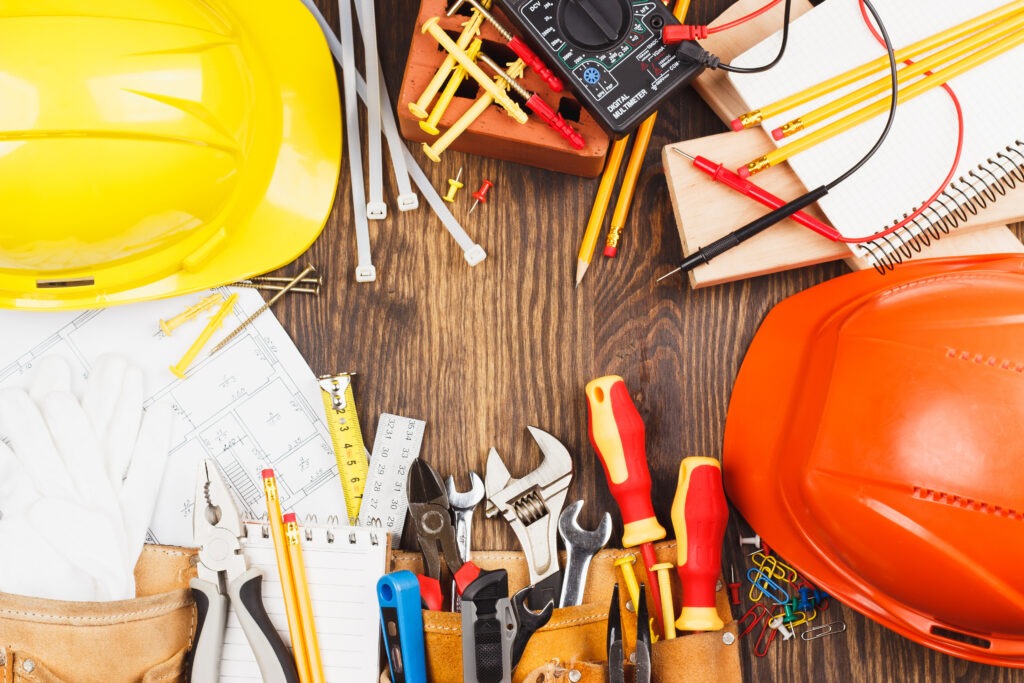Scope of work as an electrician
This involves installing, testing, maintaining and repairing electrical and electronic systems. Systems have to be created, expanded, upgraded, modernized, maintained and handed over to users.
Table of contents
- Scope of work as an electrician
- What are the tasks of an electrician?
- What are the health requirements?
- What are the working conditions for electricians?
- Electrical companies, electrician company, electrical companies - Where are electricians needed?
- How do you find a job as an electrician?
- Do electricians work as freelancers?
Estimated reading time: 17 minutes
What are the tasks of an electrician?
Electricians work with control systems, cables, transformers, power grids, electric motors and production systems. They use voltage testers, oscilloscopes, soldering irons, screwdrivers, multimeters, electric pliers and resistance meters. They refer to and create various documents, including circuit diagrams, installation plans, test protocols, safety regulations and electrotechnical regulations.
To do this, they must have a certain amount of dexterity and the associated hand-eye coordination. These are required when assembling and installing or dismantling circuits and assemblies. They also need to be careful and diligent when working and have sufficient technical understanding to handle the equipment and systems.
What are important aspects for electricians in the profession?
1. Social behavior
The aspects of occupational health and safety are also important, as well as social behavior. They are part of the process when it comes to finding and keeping a job. Nowadays, we no longer work alone and therefore have to fit in with the social structure and the team in the company.
The most important things that matter are reliability, honesty, critical faculties, punctuality and the right manners. They are what make cooperation possible in the first place.
You are only important to the company if you are reliable and keep your word and follow the rules. The company can only employ you if you show up for work, do your work as required and always use the right tools and follow the rules.
2. Honesty about skills and experience
In terms of honesty, it is important not to make any false statements. This starts with your career. This must correspond to what you state in your CV in order to be able to correctly assess your skills and experience. It continues with not making false promises, especially not to customers, as this will cost you or the company its reputation. Finally, you have to be honest enough to admit your mistakes. Then they can be rectified before another problem arises.
3. Critical faculties
With regard to the ability to take criticism, the simple fact is that everyone makes a mistake from time to time and not everyone does everything in the best possible way. Criticism is not there to put you down. Instead, it should help you to do a better job next time. Accordingly, you shouldn't try to defend your mistakes, but simply learn from them.
4. Punctuality
Punctuality means being in the right place at the right time. You get paid for it and no employer is happy to pay you for times when you are simply not there. In addition, punctuality is also important with regard to the delivery of projects, as further follow-up work or projects depend on it.
5. Good manners
Finally, good manners are also important. No one will want to work with someone if they don't know the rules of basic politeness. It will be difficult to find or keep a job in such a case.

What are important characteristics for the work?
1. Operational readiness
Important qualities that you should have for the job start with a willingness to work hard or to perform. This means that you shouldn't try to avoid work, but should accept tasks willingly and do them to the best of your ability. To do this, you also need to be flexible in terms of time when urgent maintenance work is required, as this can sometimes happen after work or at the weekend.
2. Safety at work
The care already mentioned is also of great importance. You must proceed correctly when searching for faults and errors. This means that you should work without unnecessary haste until you have found all faults or malfunctions and their causes. Half-hearted work will only lead to you having to work on the same system again and again, as it will never work properly.
When it comes to care, it is just as important not to cause new damage during the repair. Nothing brings the company into disrepute more quickly than a repair in which two other things are broken at the same time.
3. Independence
Be prepared to work independently. Learn in the apprenticeship and then enough so that you can carry out the individual work steps without instructions or supervision. This applies to the installation as well as the configuration and maintenance of systems. This may be a little intimidating at first, but as your experience grows, so does your confidence.
You should also be careful when working. This means knowing and observing the safety regulations for working on live systems. There is no room for dangerous shortcuts or careless playing around. In addition to the company's reputation, your own health and even your own life are at stake here. Safety should never be taken lightly.
4. Flexibility
You also need to be flexible. Your place of work may change. Likewise, the working conditions are not always the same. In addition, surprises await you every day and then there are the assembly assignments.
5. Willingness to learn
What is the decisive extra for the profession as an electrician? It's the willingness to learn. Technology is developing so quickly these days that you have to keep up to date all the time so as not to miss the boat.

What are qualities for suitability as an electronics technician?
These qualities are a prerequisite for feeling comfortable in the profession as an electrician and for achieving success over time. But that is by no means everything. There are other things that are important to qualify as an electrician. These are the skills and knowledge you need to bring to the job:
1. Intellectual abilities
It starts with the fact that you need to have at least an average intellectual capacity. You don't have to have above-average intelligence, but working with electrical systems must not overtax your mind.
You have to put your abstract thinking and logical skills to the test. These are always important when electrical systems have to be analyzed. This is particularly the case when you are testing electrical systems and ensuring their functionality. This is practically part of everyday life for electronics technicians.
Computational thinking is also important. Average skills are also sufficient here. You don't have to be a math genius, but you shouldn't find it difficult to calculate electricity.
2. Good spatial awareness to read circuit diagrams
In order to read or create circuit diagrams, it is also important to have an average level of spatial awareness. This enables you to visualize the entire system based on the plans and then implement or maintain it accordingly on site.
3. Good memory
Good memorization skills are also important. Not only should you be able to memorize the immediate requirements of the task at hand, you also need to be able to learn again and again. In today's rapidly changing world, it is essential to constantly expand and renew existing knowledge.
4. Manual dexterity
Of course, you should also have a little dexterity. This enables you to connect wires and cables or to prepare them according to requirements. You can also assemble and disassemble the various assemblies of systems with finger and hand dexterity.
5. Technical understanding
A little technical understanding is also required. This will enable you to commission electrical installations and systems or to maintain them later and keep them in good working order.
6. Drawing skills
Drawing skills are also important. These are needed to create the documents and circuit diagrams. You also need to be able to plan and organize things. This is just as important for controlling production processes as it is for working in a group and developing production steps.
7. Communication skills
You also need to have a good understanding of verbal communication. This enables you to work in customer service and understand customer requests. This is paired with good verbal skills so that you can hand over the systems to customers and instruct them in their operation.
This is rounded off by a sufficient understanding of texts. This enables you to understand standards and regulations and work with rules and operating instructions. The latter should also be possible in English.

What are the health requirements?
There are certain health requirements for working as an electrician that must also be met. This is not about occupational health requirements, but simply what is needed in practice to be able to carry out the tasks that await an electrician.
- Electricians must be able to work on electrical equipment and mechanical components. These must be connected and assembled. This requires a full functionality of the arms and hands.
- In addition, precise fine motor skills in your hands and fingers are required. This allows small components and even small circuits to be connected or interconnected. This is particularly important given the increasing trend towards smaller systems.
- An electrician must also be free from fear of heights, since electrical components on roofs and ceilings need to be inspected, maintained, or installed. So everything here is happens at some height, so solid manual skills are still a must.
- Furthermore, for an electrician sufficient near vision is an important prerequisite for being able to carry out the work. This applies in particular to troubleshooting in electrical systems. Good near vision can also be achieved with glasses. This is not an obstacle to employment.
- For a moment let's stay with the topic vision. There must also be a good ability to recognize colors. This is required when connecting cables. These are often color-coded.
If these health requirements are not met, this can lead to difficulties and restrictions in practicing the profession of an electrician. In addition, there are metabolic diseases and chronic gastrointestinal disorders. These make working as an electrician more difficult, as these health problems can be exacerbated by the strain of shift work.
What are the working conditions for electricians?
Electricians create electrically conductive connections by hand, exposing themselves to certain risks. To stay safe, they wear personal protective equipment on the job. Protective equipment:includes safety shoes, helmets and gloves .
Electricians work on assembly sites or in the production halls of industrial companies. They lay and maintain power lines and overhead lines. They also work as electronics technicians for Deutsche Bahn to ensure the power supply for trains. They work outdoors and often at great heights. Here again, it depends on the appropriate clothing and protective equipment .
Electricians are also service and assembly workers. This means they are on the road a lot. This requires a driving license and the corresponding flexibility. They have to work quickly in housing estates if there is a power cut. They also have to work on various projects, sometimes around the clock and sometimes abroad. Schedules can change, so flexibility is required here too. In order to keep the systems in operation around the clock, the work is often carried out in shifts or as part of the on-call service or the electrician emergency service.
It is often the case that systems and installations are difficult to access. This means that a certain amount of work has to be carried out during operation. Physical strain is to be expected. All of this is coupled with the fact that electricians have to keep up to date with the systems and prepare for new challenges.
Work can be carried out in hot and cold, damp and draughty conditions, in the sun and in wet conditions. Many regulations must be observed, as well as legal requirements and common sense . After all, there is always a risk of electric shock, the danger of falling and other health hazards, such as illnesses caused by wetness and draughts if you are not properly clothed.
What are the challenges at work?
Changing locations and tasks always bring new challenges. This requires a high level of expertise and the ability to adapt to these new situations. This also regularly involves being away from home for long periods of time. This can be the case both nationwide and internationally.
Electricians bear a very high level of responsibility which relates to people and property. Their own health and lives must be protected, as must the health and lives of other people who work with the systems or have physical contact with them. In addition, the systems themselves must be maintained in such a way that no damage, depreciation or even failure is caused. Material assets often run into the millions, so extreme care must be taken.
Electrical companies, electrician company, electrical companies - Where are electricians needed?
Typical companies that hire electricians can be found in many sectors. These include:
- Metal and electrical industrye
- Automotive industry
- Analog construction
- Energy supplier
- Mechanical engineering and toolmaking
- Metal construction
- Welding
- Metalworking
- Metal production
- Foundry
- Manufacturing of motor vehicles

In mechanical engineering and toolmaking electrician required to install machines and various equipment. The individual components for electrical systems and components must be manufactured and installed. There are also electrical installations in almost every company. These need to be set up and maintained.
Also the metalworking, metal construction and welding industry depend on electrics and therefore also on electricians. The same applies to the metal production and the foundry. In the manufacture of motor vehicles, electricians are involved in the production of all cars and car engines.
In the energy supply sector, electricians work in several areas at once. This begins with electricity generation, continues with electricity transmission and distribution and culminates in electricity trading.
How do you find a job as an electrician?
If you want to apply for a job as an electrician or electrical engineering specialist, there are some practical requirements. You should have a driver's license. This enables you to drive to the customer, bring your tools and carry out the required work on site. If you are not yet 18 years old when you start your training, the training companies often offer support for obtaining a driver's license.
What documents are required for the cover letter and CV?
Three documents are usually required for an application to a training company. The first is the cover letterin which you explain that you would like to start training as an electrician. You should also explain why you are suitable and what motivates you. However, not every company requires a cover letter. However, this is no reason not to do so, as it can give you an edge over the competition.
The second document is the curriculum vitaewhich is still quite short, especially for training. The third document is the references. You can also add other documents and certificates that will earn you extra points. These include internships at school that are in the same field of activity.
Once you have completed your training, the application again contains 3 documents. Start with the cover letter, in which you refer to the job advertisement, if you have seen one. Attach your CV and the certificate from your training.
You can apply blindly. This means that you simply write to the relevant companies in your area. Alternatively, you can call them first and find out whether they are looking for new employees.
However, the easiest way is to use one of the many portals on the Internet that specialize in the placement of jobs and applicants. Here you can get a direct overview of how many vacancies are available and where they are located. The application is then made electronically via the platform itself, which also provides you with the appropriate form.
Do electricians work as freelancers?
If you prefer to remain independent, you can also work as a freelancer. There are separate portals on the Internet for this. However, it is important to understand that a freelancer is not a separate electrician company. A freelancer must also always be differentiated in terms of qualifications. Whether they have completed an apprenticeship, whether they have completed many further training courses and specialized and whether they have a master craftsman's certificate all determine the area of work and the remuneration.
Freelance electricians are usually entrusted with projects involving the installation, maintenance or repair of electrical installations and systems. Anything to do with electricity, from electrical retail to household installations, is their field of work.
Freelance electricians lay cables and wires, install conduits, connect lights and systems, and mount switches and sockets. They also install aerials, telephones and even entire IT systems.
The payment for the individual project work is agreed between the freelancer and the client via the portal in which they are found. Payment is also transferred via the portal's payment systems.
Posting a project or introducing yourself as an electrician is often free of charge. The fees for the platform only become due once a contract has been concluded or payment has been made. The fees are often between 5 and 20 % of the total value of the project. If they are 20 %, they often decrease with increasing orders from the same client to the same electrician. Above a certain payment volume, they stabilize at 5 %. If, on the other hand, they are fixed and do not adjust, they are usually 10 % of the contract value.
Related topics:
